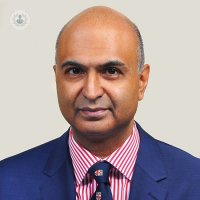Palpitations: when should I seek medical attention?
Written by:What are heart palpitations?
Palpitations is the general term used by doctors to describe any unusual and persistent awaremess of your heartbeat. People often describe palpitations in various ways. Skipped beats, missing heartbeats and a flutter in heart rhythm are typical descriptions.

What are the main causes of heart palpitations?
There are a number of causes of palpitations but broadly speaking, the main categories include a significant proportion of people who will have palpitations and within whom doctors carry out investigations but they don’t find anything serious - in the sense that they are able to confirm normal cardiac structure and function.
The doctors carry out rhythm monitoring and what they tend to find is ectopic beats; ventricular and superventricular topic beats. Sometimes patients can be quite aware of these eptopic beats. Doctors will generally reassure them that the eptoic beats are never going to cause them any serious harm.
Doctors also look at lifestyle factors which may be having an impact on these types of symptoms. Most of the time that is effective and only a small proportion of patients actually need treatment for these eptopic beats.
Can atrial fibrillation contribute to heart palpitations?
The second category which contributes to heart palpitations is an important rhythm diagnosis called atrial fibrillation. It is essential to screen the population for this arrthymia because it gets more common as you get older. It is associated with high blood pressure or hypertension and can run in families.
Atrial fibrillation is important to screen for and diagnose in certain types of patients because it has important treatment options e.g. many patients will need to be advised for blood thinning to stop them from having blood clots. However, even atrial fibrillation, which is the most common arrthymia diagnosed in association with palpatations, is not usually a serious or life threatening condition but it does need important treatment.
Are heart palpitations common within those who have existing heart problems?
The group of patients which is relatively less common are people who have already got heart problems. These are people that have already had admissions with heart related problems and they often will already have some degree of structural problems with their heart. In those patients there are another set of rhythm disturbances which potentially can be more serious and require specific treatment.
When should immediate medical attention be sought?
The general advice is that if you have any persistent, chest discomfort or breathing difficulties and if these symptoms are severe and persistent, the safest thing to do is to always seek medical attention. If this occurs in the middle of the night and there is severe symptoms of that, you will have to go to the casualty department.
If the symptoms are not so disabling, then you could try and make an appointment to see your GP. The safest thing to do is, if any symptoms are severe or persistent and they are causing you to feel unwell e.g. causing you to feel very dizzy or breathless, you should seek immediate medical attention.

What other medical conditions can typically cause heart palpitations?
Sometimes you can experience heart palpitations in association with other medical problems. One of the most commonly asked questions is ‘does thyroid disfunction cause palpitations?’
Although books may say that thyroid disfunction and in particular overactive thyroid can cause palpitations, in real life practice this is not the case. It is actuallly relatively uncommon.
However, you can get palpitations with any severe medial illness, therefore, if you are admitted to hospital, if you have a very bad infection, if you’re having other problems with other parts of your body or if you’re severly unwell, you can experience palpitations as part of that. In fact, in a small proportion of people, an arrthymia may be discovered.
How might too much or too little thyroid hormone affect or cause heart palpitations?
Thyroid disfunction is linked with palpitations but it is relatively uncommon. Doctors are often advised to check for thyroid palpitations within patients who are presented with thyroid problems but results often come back abnormal. Therefore it is relatively rare but it’s always screened for.
For patients who have already have established thyroid problems, doctors strive for what’s known as the euthyroid status. In other words, they want to make sure that the patients’ thyroid function is stable. In order to do this, they gauge it with a blood test which assesses the status of the thyroid.
Sometimes if you’ve got an overactive thyroid, in association with palpitations, then a specialist might advise an appropriate investigation of why you’ve got an overactive thyroid but certain treatment may be suggested.
An underactive thyroid is quite unlikely to be associated with or cause palpitations so it’s really the overactive thyroid state.
What are some useful and effective home remedies that can help prevent heart palpitations?
Doctors normally promote certain health measures that they advise for most patients, not just those presenting with heart palpitations. This would include that they should partake in regular exercise to promote cardiovascular fitness.
They recommend that patients follow a healthy diet which has a broad spectrum of vitamins, minerals and fibre. They should also refrain from excessive alcohol consumption and not to smoke cigarettes.


